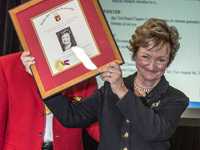 Two-thirds of SigEp chapter houses had a house mother in 1970. Fewer than one in ten have one now. Mentorship and guidance from house mothers has always been highly valued, but the demand for academic support and professional mentorship has far exceeded the supply of volunteers in our ranks. In many cases, the house mother has given way to another type of live-in mentor – the resident scholar.
Two-thirds of SigEp chapter houses had a house mother in 1970. Fewer than one in ten have one now. Mentorship and guidance from house mothers has always been highly valued, but the demand for academic support and professional mentorship has far exceeded the supply of volunteers in our ranks. In many cases, the house mother has given way to another type of live-in mentor – the resident scholar.
SigEp caught up with its most iconic house mother and a three-year and current resident scholar to capture their perspectives on the role of a live-in mentor.
Nonnie Owens has dedicated much of her life to supporting SigEp and is lovingly referred to by thousands of brothers as “Mom Nonnie.” She’s conducted etiquette seminars at SigEp’s national programs and provided training to our Headquarters staff for much of the last two decades. And she first served as house mother to our Southern Methodist and Purdue chapters.
Like Nonnie, Tony Lazarowicz, Nebraska Renaissance, had never lived in a fraternity house before his first experience as a live-in mentor. His alma mater did not have fraternities, and he was beginning to pursue a Ph.D. at Nebraska-Lincoln when he moved into the RLC-accredited Nebraska Alpha chapter house in the summer of 2010.
Journal: What drew you to choose to live in a SigEp chapter house?
Nonnie: After a brief chapter visit in March of 1992, there was chemistry with the friendships, and I just knew that it would be beneficial for [Purdue] to have a live-in housemother. I was willing to make the move and take a chance.
Lazarowicz: I came from a small institution with no Greek system, but I was well aware of the stereotypes that the Greek system had. After consulting with a few colleagues on campus, I determined that indeed this house was a well-respected chapter in the UNL community, and that I would feel comfortable taking on this role.
J: What are some typical activities involved in your job?
N: Hosting dinners with special guests. Creating etiquette dinners for brothers and their guests. Helping the cook plan special events such as parents’ weekend, homecoming and alumni outings. I also did a lot of proof reading!
L: Mentoring the executive team in meetings, co-teaching our freshmen honors course; provide personal, academic and career counseling; and providing guidance during situations that come up regarding house and member safety.
J: Tony, What do you think is the most important part of your job?
L: The most important part of my job is to be present. Young men, in their formative years of life, are on their own and need someone to be present who can guide them.
J: Mom Nonnie, how would you describe your role as a house mother? Did you see your role as a surrogate parent, a friend, a mentor or something else?
N: I was just “the mom,” but realistically, I was a mentor before the Balanced Man Program termed it.









Leave a Reply